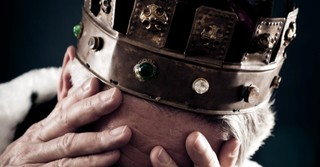How Old Was David When He...(A Timeline of David's Life)
Share

Few biblical stories have captivated us more than David's life and times. From simple shepherd to King of Israel, David’s journey is filled with honor, dignity, and victory, as well as anguish, despair, and unrelenting heartache. As we discover in scripture, his sacred, covenant relationship with God is the golden thread woven throughout his days (2 Samuel 7:8-17). Let’s take a closer look at specific seasons in David’s life, and marvel at God’s work in the heart of this humble musician, poet, warrior, and shepherd-king.
Photo credit: ©GettyImages/artplus

How Old Was David When He Was Anointed King?
We are familiar with the scene. Jesse, father of eight strapping sons, stands undoubtedly in awe and wonder as the prophet Samuel gazes on the proud father’s seven oldest sons—ready to anoint one of them the future king of the Israelite people. Imagine! One of his offspring was to replace King Saul (1 Samuel 16).
But there is hesitation from the revered prophet, and a question:
So he (Samuel) asked Jesse, "Are these all the sons you have?" "There is still the youngest," Jesse answered. "He is tending the sheep." Samuel said, "Send for him; we will not sit down until he arrives" (1 Samuel 16:11).
Can we see Jesse’s raised brow of surprise? Even the prophet had seemed impressed, as Eliab, then Abinadab, followed by Shammah and the others, passed by—strong, tall, able-bodied, fighting-aged men (1 Samuel 16:6-10). But there is an unseen, quiet communion between Samuel and the One who sent him on this unusual mission, and God whispers, “Do not consider his appearance or his height, for I have rejected him...” (1 Samuel 16:7).
Samuel receives the same spirit-whisper as he studies each son and proclaims, “The Lord has not chosen these” (1 Samuel 16:10). So, they stand and wait for the youngest son, whose father didn’t even think to call forward for the prophet’s inspection.
When the young shepherd arrives—glowing with the strength and vigor of his work—Samuel receives the awaited confirmation from God: “Rise and anoint him; this is the one” (1 Samuel 12). A tender heart for God is confirmed. Oil is poured in the family’s presence, and the Spirit of God rests on David, future king and warrior (1 Samuel 16:13).
How old was David when he was anointed king? Too young to be considered by his father for Samuel’s review, the shepherd boy had not reached the official fighting age and was most likely in his early to mid-teens—old enough to care for his family’s flock, and strong enough to defend them from wild animals (1 Samuel 17:34-36).
Photo: Public Domain (1919 illustration) via Wikimedia Commons

How Old Was David When He Fought Goliath?
Scripture does not specify David’s age when he faced Goliath, but he was likely still a teenager—the ongoing caregiver of Jesse’s flocks—still too young to join the Israelite army.
After David’s anointing by Samuel, the narrative in 1 Samuel 16 opens with King Saul restless and tormented in his soul. Because of his sin and rebellion, God has withdrawn His spirit from Israel’s first king. Saul longs for relief; the soothing strains of music are suggested, and a search is ordered for someone skilled at playing the lyre. An attendant informs King Saul that Jesse’s youngest son, David, is a skilled musician, a brave shepherd-warrior, and that God is with him. David enters the King’s service as an armor-bearer and musician, dividing his time between kingly service and caring for his family’s flocks (1 Samuel 16:14-23).
As 1 Samuel 17 opens with battle lines drawn between Israel and the Philistines, we see David—still serving both king and family—sent by his father to the battlefield to check on his older brothers. David arrives at the Israelite camp and is filled with indignation as the Philistines, led by a giant, monster of a man, repeatedly mock the army of God.
A best-on-best challenge is thrown by the Philistine warrior, Goliath—nine feet tall with impenetrable armor—and the Israelites are left mumbling and cowering in fear. His brothers ridicule David as the young shepherd declares he will face this enemy.
Word of David’s claims reaches the ears of King Saul, and the bold teenager is summoned. 1 Samuel 17:32 reads, "David said to Saul, 'Let no one lose heart on account of this Philistine; your servant will go and fight him.'”
The King’s armor is offered but is unsuitable for the boy who has roamed fields, streams, and rocks, caring for wandering sheep, and who has rescued those sheep from the mouths of lions and bears, killing the bloodthirsty predators with his bare hands. With righteous confidence from the God he served, David assured the king that the evil Philistine would not be a problem (1 Samuel 17:34-37).
Shockingly young, but in a magnificent display of the power of the Living God, the future king of Israel stepped forward with a staff, five smooth stones, his shepherd’s bag, and a sling. Goliath and the Philistines are defeated, and the One True God is glorified (1 Samuel 17:40-50).
Image created using AI technology and subsequently edited and reviewed by our editorial team.

How Old Was David When He Actually Became King?
After King Saul and his son, Jonathan, died, the Bible states, “In the course of time” (2 Samuel 2:1), the Lord sent David to Hebron, where the men of Judah anointed him their king.
2 Samuel 5:3-5 gives us specifics:
When all the elders of Israel had come to King David at Hebron, the king made a covenant with them at Hebron before the Lord, and they anointed David king over Israel. David was thirty years old when he became king, and he reigned forty years. In Hebron he reigned over Judah seven years and six months, and in Jerusalem he reigned over all Israel and Judah thirty-three years.
From a teenage giant-slayer to a 30-year-old king and beyond, David’s life continued to be a series of brave feats, communion with God, hardships, struggles, temptations, and ongoing warfare.
Image created using AI technology and subsequently edited and reviewed by our editorial team.

How Old Was David When He Sinned with Bathsheba?
Scripture does not give a specific age for David when he sinned with Bathsheba, but he was probably in his early 40s. The king had reigned in Hebron for seven and a half years, battled with the house of Saul, “a long time” (2 Samuel 3), been anointed king over Israel, defeated the Philistines (2 Samuel 5:17-25), and moved the ark of God to Jerusalem (2 Samuel 6).
2 Samuel 11 opens with a restless king who stays home when his army traditionally went to war. As his warriors fight the Ammonites, King David has trouble sleeping one evening and walks on the palace roof. From his exalted vantage point, he sees a beautiful woman bathing, learns she is Uriah the Hittite’s wife, Bathsheba, and has her brought to him.
In time, Bathsheba sends word to the king of her pregnancy, and instead of facing his sin, David plots to cover his wrongdoing. Initially, Uriah is given time off from battle and is encouraged by the king to return home and rest (2 Samuel 11:6-10). Uriah refuses to accept preferential treatment and, when questioned by the king, exclaims, “The ark and Israel and Judah are staying in tents, and my commander Joab and my lord’s men are camped in the open country. How could I go to my house to eat and drink and make love to my wife? As surely as you live, I will not do such a thing!” (2 Samuel 11:11)
King David, faced with an honorable man, sinks deeper into his transgression and arranges the death of Uriah. The righteous warrior is placed on the front lines of the war where the battle is the fiercest—some in David’s army fall, including Uriah the Hittite (1 Samuel 11:17).
After his plan succeeds in hiding his sin, David brings Bathsheba into the palace and makes her his wife. However, the scriptures clearly state that David’s wickedness is not hidden from God.
After the time of mourning was over, David had her brought to his house, and she became his wife and bore him a son. But the thing David had done displeased the Lord (2 Samuel 11:27).
Image created using AI technology and subsequently edited and reviewed by our editorial team.

How Old Was David When Absalom Rebelled against Him?
Scripture gives us clues about David’s age when Absalom rebelled. David’s third son, Absalom, was born when the king ruled for seven and a half years in Hebron (2 Samuel 3:3). Allowing for time to mature into adulthood and for the years he fled after the killing of his brother, Amnon, Absalom was likely in his late twenties when he conspired to overthrow his father. This would make David in his early sixties.
Absalom’s rebellion is a heartbreaking episode in David's life. The king loved his son and grieved his absence after Amnon's death (2 Samuel 13:39, 2 Samuel 14:1). This love and longing are not reciprocated, and Absalom works to steal the hearts of the Israelite people from his father.
Absalom would stand by the road leading to the city gate and stop anyone on their way to speak with King David concerning a complaint or decision. Using charm and flattery, Absalom convinced the people he would be a better king; his following grew over four years, and David and his officials were forced to flee (2 Samuel 15).
This season of David’s life was also tragic for those loyal to him. As the king and his followers fled Jerusalem, the “whole countryside” wept aloud (2 Samuel 15:23).
Photo credit: ©GettyImages/Maudib

How Old Was David When He Died?
David became king at age 30 and reigned over Judah in Hebron for seven and a half years and over all of Israel in Jerusalem for 33 years. This gives us an approximate age of death around 70.
As his time of death drew closer, David called his son, Solomon, and gave him a charge and blessing. “I am about to go the way of all the earth,” he said. “So be strong, act like a man, and observe what the Lord your God requires: Walk in obedience to him, and keep his decrees and commands, his laws and regulations, as written in the Law of Moses” (1 Kings 2:2-3).
Then the shepherd-king “rested with his fathers and was buried in the City of David” (1 Kings 2:10).
Photo credit: ©Getty Images/nullplus

What Can We Learn from David's Life and Age Milestones?
Scripture tells us that God considered David a man after His own heart (1 Samuel 13:14, Acts 13:22). As a shepherd protecting the family’s flocks, we see David’s faithfulness in early responsibilities—work that prepared the young warrior for future battles. Faith and obedience in small things prepare us to follow God in greater things. Although deeply flawed, David repented and had a heart that loved God and sought to follow him. Ultimately, David's legacy continued as Christ was from "the line of David" (Luke 1:32) and born in "the City of David" (Luke 2:11).
When facing Goliath, David’s courage reminds us to trust in God’s power, not our own. Bravery grows from God-confidence but becomes shaky and unsure when relying on self-confidence.
As King of Israel, David sought divine wisdom and experienced his Lord’s favor and guidance. However, sin crept into David’s heart during a time of ease and complacency, leading to betrayal, deceit, and severe consequences for the king and his people. Our obedience must be ongoing, and our call to take up our armor daily—to protect us from the enemy’s arrows—is vital (Ephesians 6:10).
Overall, David’s life teaches us the magnitude of redemption. As David faces severe hardship, including estrangement from his son and ongoing attacks from his enemies, we see a man of humility and repentance. We see an earthly king willing to submit to his Heavenly King. We see a sacred example of a deeply flawed man with a lifelong yearning to serve God wholeheartedly. In David’s words, In the morning, Lord, you hear my voice; in the morning I lay my requests before you and wait expectantly (Psalm 5:3).
Photo credit: ©GettyImages

You’ll find Leigh Ann on an adventure with her sweetheart of 39 years, getting silly with her grands, or daydreaming story plots on the front porch.
Connect on LeighAThomas.com.